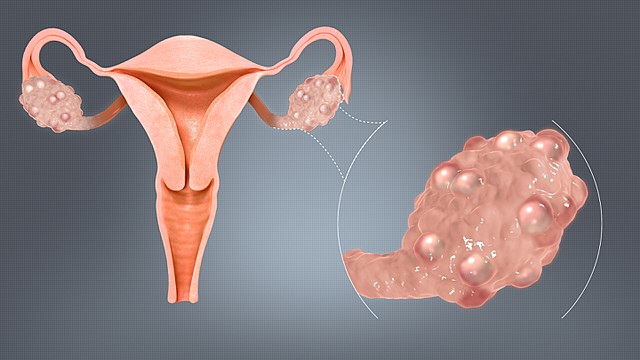Ladies, have you been experiencing unexplained weight gain, irregular periods, or acne? These symptoms may seem unrelated at first glance but could be the telltale signs of a hormonal disorder called Polycystic Ovary Syndrome or pcosco for short.
This condition affects 1 in 10 women worldwide and can lead to fertility issues if left untreated. In this blog post, we will explore the common symptoms of PCOSCO, how it is diagnosed and treated, and what lifestyle changes can be made to improve your overall health.
We’ll also take a look at some of the myths surrounding this condition so that you can make informed decisions about your own health.
Ladies, ever felt like your body is playing a cruel joke on you? Polycystic Ovary Syndrome (pcosco) is one of those conditions that can feel like an impossible riddle to solve. It’s not just about irregular periods or difficulty conceiving; PCOS can wreak havoc on your entire endocrine system and make you feel terrible all around.
But fear not! In this blog post, we’ll be breaking down the most common symptoms of PCOSCO so that you can gain insight into what may be causing your discomfort and how to get treatment.
So grab a cup of tea, cozy up with us, and let’s dive into the world of PCOSCO together!
‘ll explore the common PCOS symptoms and empower you with knowledge to seek proper diagnosis and treatment. Let’s dive in!
What is PCOSCO?
Polycystic ovary syndrome (pcosco) is a hormonal disorder that affects women of reproductive age. The main features of PCOS include irregular or absent menstrual periods, excess androgen levels, and polycystic ovaries.
Pcosco can cause a wide variety of symptoms, including irregular periods, fertility problems, weight gain, acne, unwanted hair growth, and mood swings. Many women with Pcosco also have insulin resistance, which can lead to type 2 diabetes.
While there is no cure for pcosco, treatments are available to help manage the symptoms. These include birth control pills, lifestyle changes, and medication for insulin resistance.
Polycystic ovarian syndrome (Pcosco) is a hormonal disorder that affects women of reproductive age. The cause of PCOS is unknown, but it is thought to be related to excess insulin, a hormone that regulates blood sugar.
PCOS can cause missed or irregular periods, and can lead to fertility problems. It can also cause other health problems, such as obesity, type 2 diabetes, and high blood pressure.
PCOS is diagnosed through a physical exam and blood tests. There is no cure for PCOS, but treatment can help manage the symptoms and reduce the risk of complications.
The Different Types of pcosco?
There are four main types of Pcosco:
1. Insulin-resistant Pcosco: This type of PCOSis characterized by insulin resistance, which can lead to high levels of insulin in the body. This can make it difficult to lose weight, and can also increase the risk for type 2 diabetes.
2. Inflammatory PCOS: This type of PCOS is characterized by inflammation in the ovaries, which can lead to pain and other symptoms.
3. Hormonal PCOS: This type of PCOS is characterized by hormonal imbalances, which can lead to irregular periods, excess hair growth, and acne.
4. Metabolic PCOS: This type of PCOS is characterized by metabolic problems, which can lead to obesity and increased risks for heart disease and stroke.
Symptoms of Pcosco
There are a variety of symptoms that are associated with Polycystic Ovary Syndrome (Pcosco). The most common symptoms include:
-Irregular or no menstrual periods
-Heavy bleeding during periods
-Pain during periods
-Acne
-Weight gain or difficulty losing weight
-Excess hair growth on the face, chest, back, or abdomen
-Thinning hair on the scalp
-Oily skin or dandruff
Pcosco can also cause fertility problems. Women with PCOS may have a hard time getting pregnant because they don’t ovulate regularly. If you’re having trouble conceiving, talk to your doctor about treatment options.
Polycystic ovary syndrome (PCOS) is a hormonal disorder that can affect women of childbearing age. The symptoms of PCOS vary from woman to woman and can include irregular menstrual periods, excess hair growth, acne, and obesity.
Pcosco is often diagnosed in women who have infrequent or absent periods, or who have difficulty getting pregnant. However, not all women with PCOS experience these symptoms. In fact, many women with PCOS are unaware they have the condition until they have difficulty conceiving or are diagnosed with another health condition related to PCOS.
The most common symptom of PCOS is irregular menstrual periods. Women with PCOS may have fewer than eight periods in a year, or they may skip months between periods. Some women with PCOS stop having period altogether.
Other common symptoms of Pcosco include:
Excess hair growth (hirsutism) on the face, chest, back, or thighs
Weight gain and difficulty losing weight
Thinning hair on the scalp
Acne breakouts on the face, chest, and back
Oily skin
Causes of PCOSO
There are a variety of possible causes of Pcosco, as the condition can be influenced by a number of different factors. One of the most common theories is that PCOSO is caused by an imbalance in hormones, particularly androgens (male sex hormones). This hormone imbalance can lead to the development of ovarian cysts, as well as other symptoms like excess hair growth and acne.
PCOSO may also be caused by insulin resistance, which is when the body doesn’t respond properly to insulin. Insulin resistance can lead to high levels of insulin in the blood, and this can in turn trigger the ovaries to produce more testosterone.
Other possible causes of Pcosco include inflammation, genetic factors, and certain lifestyle choices such as being overweight or obese.
There are many possible causes of PCOS, but the most likely cause is an imbalance in hormones. This can be caused by a variety of factors, including insulin resistance, inflammation, and excess male hormones (androgens).
Pcosco is often associated with insulin resistance, which means that the body doesn’t respond properly to the hormone insulin. Insulin resistance can be caused by a variety of factors, including genetics, diet, and lifestyle.
Obesity is another factor that can contribute to PCOS. Obesity can lead to insulin resistance and increase levels of androgens in the body.
Inflammation is also thought to play a role in the development of PCOS. Chronic inflammation can damage the ovaries and lead to an imbalance of hormones.
Excess levels of androgens (male hormones) are another possible cause of PCOS. Androgens can interfere with ovulation and lead to the development of cysts on the ovaries.
Diagnosing Pcosco
If you think you might have Pcosco, it’s important to see your doctor to get a diagnosis. There is no one test for PCOS, so your doctor will likely need to do a few different things to diagnose the condition.
Your doctor will start by taking your medical history and doing a physical exam. They may also order blood tests to check your hormone levels. An ultrasound of your ovaries may also be done.
PCOSO can be diagnosed if you have two of the following three conditions:
-Irregular or no menstrual periods
-Elevated levels of androgens (male hormones) in the blood
-Polycystic ovaries on an ultrasound exam
If you are diagnosed with PCOS, treatment will be based on your symptoms and health goals. Common treatments include birth control pills, anti-androgen medications, and insulin-sensitizing drugs. Surgery is also an option in some cases.
Treatments for PCOS
There are a variety of treatments available for those suffering from PCOS. Many women find that birth control helps to regulate their hormones and alleviate symptoms. Others may require medication to help with weight loss or fertility issues. A healthy diet and regular exercise are also important in managing the symptoms of PCOS.
There is no one-size-fits-all treatment for polycystic ovary syndrome (PCOS), but there are many options available that can help manage the symptoms. The most important thing is to work with a healthcare provider who can tailor a treatment plan to your individual needs.
Some common treatments for PCOS include:
– Birth control pills: These can help regulate hormone levels and reduce the risk of endometrial cancer.
– Metformin: This medication can help improve insulin resistance, which is a common problem in women with PCOS.
– Clomiphene: This medication can stimulate ovulation, which can be helpful if you are trying to get pregnant.
– Surgery: In some cases, surgery may be recommended to remove ovarian cysts or treat endometriosis.
Prevention of PCOS
There is no one definitive way to prevent PCOS, as the underlying cause is still unknown. However, there are some lifestyle and medical interventions that may help to reduce the severity of symptoms or prevent the condition from developing in the first place.
Lifestyle changes such as maintaining a healthy weight, eating a balanced diet, and getting regular exercise can help to regulate hormone levels and improve insulin sensitivity. These changes may also help to reduce the risk of other conditions associated with PCOS, such as type 2 diabetes and heart disease.
Certain medications can also be used to manage hormone levels in women with PCOS. Birth control pills can help to regulate ovulation and decrease testosterone levels. Metformin, a medication typically used to treat type 2 diabetes, can also be effective in managing PCOS symptoms by improving insulin sensitivity.
Conclusion
We hope that this article has helped provide you with a better understanding of PCOSCO: Polycystic Ovary Syndrome Symptoms and what it entails. It is important to note that the symptoms are different for everyone, and it is essential to stay informed about them so that early diagnosis and treatment can be sought.
PCOSCO is a serious health condition that affects the life of many women. Learning more about its symptoms, causes and treatment options can help you gain a better understanding of this disorder and how to manage it. With proper care and lifestyle changes, it is possible to manage your Polycystic Ovary Syndrome Symptoms and lead an active and healthy life!
If you suspect you may have PCOSCO, please do not hesitate to get checked out by your doctor immediately – early detection of any condition greatly increases the chances of successful treatment!
PCOSCO is a complex disorder that affects many women, and it can be difficult to diagnose. However, understanding the signs and symptoms of PCOS can help you get a diagnosis quickly so that you can start treatment as soon as possible.
With the right treatments, lifestyle changes, and support from your doctor, managing PCOSCO doesn’t have to feel like an overwhelming task. If you think you may have polycystic ovary syndrome or if you have any other health concerns related to your reproductive system, talk to your doctor about getting tested.















